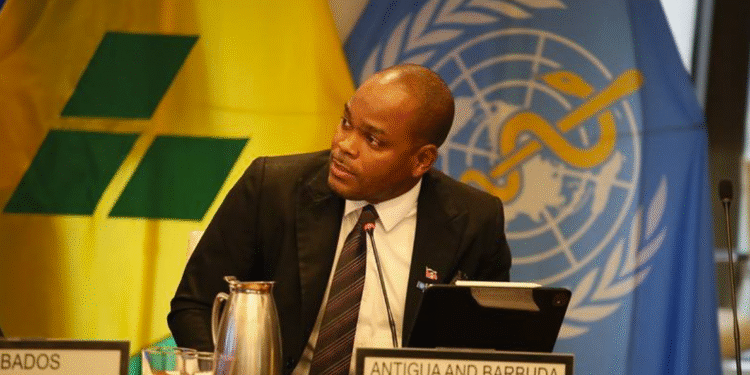Antigua and Barbuda has reaffirmed its commitment to regional solidarity and universal health with the signing of the Multi-Country Cooperation Strategy (MCCS) 2026–2031 for Barbados and the Eastern Caribbean Countries. The signing ceremony took place in Washington, D.C., on the sidelines of the 62nd Directing Council of the Pan American Health Organization (PAHO).
The Antigua and Barbuda delegation was led by Minister of State in the Ministry of Health, Senator Michael Joseph, who signed the Strategy on behalf of the Government of Antigua and Barbuda. Chief Medical Officer, Dr. Kamaria DeCastro was also part of the delegation.
Delivering remarks at the ceremony, Senator Joseph stated:
“Our countries stand at a pivotal moment. We face the dual burden of high rates of non-communicable diseases alongside persistent infectious threats, now compounded by the growing reality of climate-related disasters. While life expectancy in our region remains high, we know that equity gaps persist, widened by income inequality, vulnerabilities among marginalised groups, and long-standing health system challenges such as workforce shortages, financing constraints, and high out-of-pocket spending.
“In response, our governments have taken bold steps. We have strengthened primary health care, advanced national health insurance initiatives, and invested in climate-resilient infrastructure through programmes such as PAHO’s Smart Health Facilities. We have also seen stronger political commitment to NCD prevention, antimicrobial resistance initiatives, and the adoption of digital information systems for health. The integration of mental health into primary care, together with life-course approaches to adolescent and elderly health, signals a decisive shift toward people-centred care.”
Senator Joseph noted that despite these gains, Caribbean countries are mindful of their vulnerabilities — from economic dependencies to climate risks — that continue to test their resilience. This, he added, makes the strategy even more vital. According to the Minister of State…the ceremony goes beyond symbolism as it serves as a renewal of the promise to the people of Antigua and Barbuda, and to the wider region, that the government will build sustainable, inclusive health systems that leave no one behind.
“By prioritising health equity, investing in people-centred and climate-adaptive systems, and working hand-in-hand with PAHO and WHO, we are charting a course toward a healthier, stronger, and more unified future,” he observed.
The signing also carried special symbolic weight as September marks the anniversaries of several Caribbean nations joining PAHO in the 1980s — including Antigua and Barbuda, Dominica, Saint Kitts and Nevis, Saint Lucia, and Saint Vincent and the Grenadines. These milestones followed earlier membership by Barbados in 1967 and Grenada in 1977.



